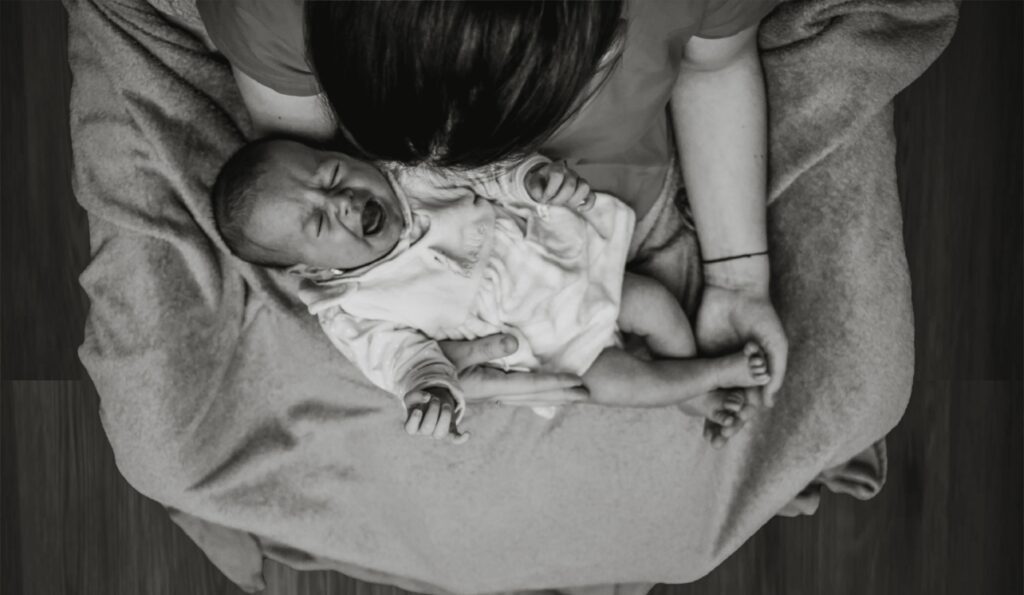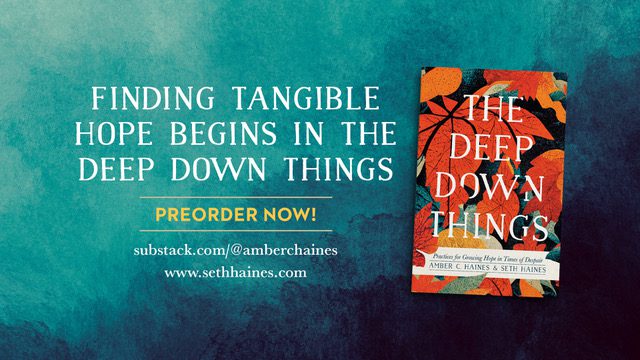Broken for You
When his crying woke me, night had already descended.
Worn down by seven weeks of sleep deprivation, I’d put myself to bed before sundown. This was how I’d survive the grueling newborn stage again: I’d “sleep when the baby’s sleeping” away my tiredness.
I pawed at my phone and checked the time. 2 a.m. I’d only gotten a few hours of sleep since my baby’s last feeding, and I was hungry for more. I wanted to stay cocooned in my warm comforter, anchored by my dog curled against my legs, lulled to sleep by the gentle hum of the sound machine.
But my newborn was also hungry, and his needs came first.
I scooped Adam out of his crib and settled into the glider to nurse him. A pinprick feeling filled my chest, then the sweet relief of letdown washed over me.
Adam was my second child, conceived a month after a devastating miscarriage and born five years apart from his older brother Jack. I’d loved nursing Jack and cherished the opportunity to do so for Adam. For many years, I wasn’t sure I’d have another child. I knew I should be grateful for this moment, but tonight I felt conflicted.
Enduring night after night of broken sleep had worn on me. Each night was akin to running hills, which I dreaded as a young cross country athlete. Up and down, up and down we’d climb, each round testing our endurance. Each hill, my legs grew heavier, as if I were trying to outrun quicksand.
How long must I run, God? How many more nights of broken sleep will I endure?
My eyelids fluttered and I realized I was dozing off, and so was Adam. Do. Not. Sleep. Here. Again. The previous night I’d slept with him in the glider and awoke with a crick in my neck and crushing guilt for sleeping with Adam in an unapproved position. With a gentle nudge, I roused my baby and carried him to the changing table.
Unzip. Pull. Wipe. Push. Zip. Pure muscle memory guided my tired limbs through Adam’s routine diaper change.
Soon we were in the glider again to finish his feeding. “There you go, sweet baby,” I cooed, snuggling Adam into the crook of my arm. My lips brushed against his peach fuzz hair, and I breathed in his honeyed scent.
An image came to mind. Many years ago, I heard Reverend Nadia Bolz-Weber preach at an event for Lutheran youth. Addressing the crowd, she described “God’s voice [as] a warm, singsong of a mother to her newborn. The one that says, ‘You are mine.’ God’s voice calls us worthy, and there’s a word for that, and that word is ‘grace.’” 1
Goosebumps raced up my spine. The pastor’s message was tailored to teens, and yet I felt as if she’d spoken directly to me.
God’s like that? Like a newborn mother? Tears pricked in my eyes.
I could scarcely believe what I was hearing. Had other pastors I’d listened to preached on God’s mothering attributes? Though I grew up in a conservative church that focused heavily on God as father, it’s possible. Scripture is filled with feminine images for God—God as a mother hen (Luke 13:34), a mother bear (Hosea 13:8), a mother in labor (Isaiah 42:14), a nursing mother (Isaiah 49:15). Whether I’d received a sermon on a Mothering God before is uncertain; certainly, I could not have felt this metaphor as deeply until I became a mother.
What a difference it makes that God knows the invisible, unsung labor of the newborn mother. I imagine God up at 2 a.m., feeding her baby and changing diapers. God kissing her baby’s crown and cradling her close, fulfilling each need with care and compassion. Such an image dignifies this demanding work.
God knows what it’s like to live in a mothering body. God sees us rising in the dark to care for our children, offering a kind of grace only we can offer.
As a mother to a newborn for a second time, this image of God continued to expand for me. What about the moments when I feel at war with myself? Does God grapple with dread and fatigue in caring for us, God’s children? Does God ever long for a night of unbroken sleep?
The words of the Eucharist come to mind: “This is my body, broken for you” (1 Corinthians 11:24).
When Jesus said this to his disciples, he was referring to his own body, his coming sacrifice on Calvary. My body was split open on the days each of my children were born. My body continues to break in countless little ways in service to my children: from thinning hair to the soft curves of flesh where skin was once taut, to bites, bumps and bruises from caring for a toddler. Our bodies break when we mother. Our bodies break and reflect the healing, nourishing work of our Creator. Our bodies break as part of our becoming.
Adam sighed contentedly and pursed his mouth shut. I tightened his sleep sack and rose, steeling myself for the last leg of this wakeup. Time to put him to sleep.
With my newborn nestled in my arms, I shuffled out of the nursery past the dining room table and towards the glow of our Nest thermostat. I shushed, swayed, and shuffled some more. We circled the entire living room and paused at the front door. Faint light from the street lights glimmered into this space. Looking down, I saw Adam was halfway between drowsy and awake, eyes closed, his body calming. But he wasn’t quite still. I took another lap around the house.
There is a verse in Scripture I have always wondered about:
“Can a woman forget her nursing child
or show no compassion for the child of her womb?
Even these might forget,
yet I will not forget you.”
—Isaiah 49:15
Would I remember this time with Adam, in all its beauty and brokenness? I hoped so. Forgetting seemed impossible. Waking to care for Jack still burned in my mind. I doubt I’ll ever forget nursing my children in the dark — it’s been too painful, too poignant — though I suspect the scenes may become foggier with time.
What remains sharp: In the dark, in my hour of need, God draws near. In the dark, God seems far away. In the dark, I long for God, and I long to be anywhere else but here. Holding my baby is an impossible weight to bear. Holding my baby feels like heaven. God is with me in the dark. God knows what’s like to break open. To become. To mother. God knows me.
All of these thoughts are in tension. All of them true.
Adam’s breathing slowed to a whisper. Lightly, I placed him in his crib, and snuck into my own bed steps away. I curled up under the covers and watched the rise and fall of my newborn’s chest. The white noise machine buzzed and beckoned. My eyelids grew heavy and I gave in to sleep.
I will not forget you. You are mine.
Endnotes
- Listen to the talk referenced by Reverend Nadia Bolz-Weber HERE. (The quote mentioned can be found at the 15:50 mark.)
Erin Strybis is a Chicago-based writer, mama of two and coauthor of The Beauty of Motherhood: Grace-Filled Devotions for the Early Years. Her stories have appeared in The Washington Post, Coffee + Crumbs, Living Lutheran, The Everymom and elsewhere. She also writes Nourish, a monthly Substack to help you be kinder to yourself and others. When she’s not chasing her kids or writing, Erin enjoys practicing yoga, singing at church or curling up with a good book. Connect with her on Instagram (@erinstrybis) and at erinstrybis.com, where you can subscribe to Nourish and order The Beauty of Motherhood.
This week’s sponsor of Mothering Spirit is Brazos Press, publisher of The Deep Down Things by Amber C. Haines and Seth Haines. In The Deep Down Things, Amber and Seth point to a simple truth: even in the darkest times, there are tangible signs of hope all around us. They demonstrate how tasting, touching, feeling, holding, and participating in these tangible acts of hope picks us up, builds our strength, and moves us into beauty, even in times of despair.



Always love your words, Erin. “What a difference it makes that God knows the invisible, unsung labor of the newborn mother.” – Yes <3
Thank you, Megan!
God draws near. yes and amen. Thank you for this reminder and the gift of your words.
Thank you, Kim!
“Such an image dignifies this demanding work.” I love this, and love thinking of this image of grace to dignify the never-ending work of motherhood. Your words are a balm, Erin. Thank you for sharing this peaceful moment and your writing here.
Thank you so much, Fay!